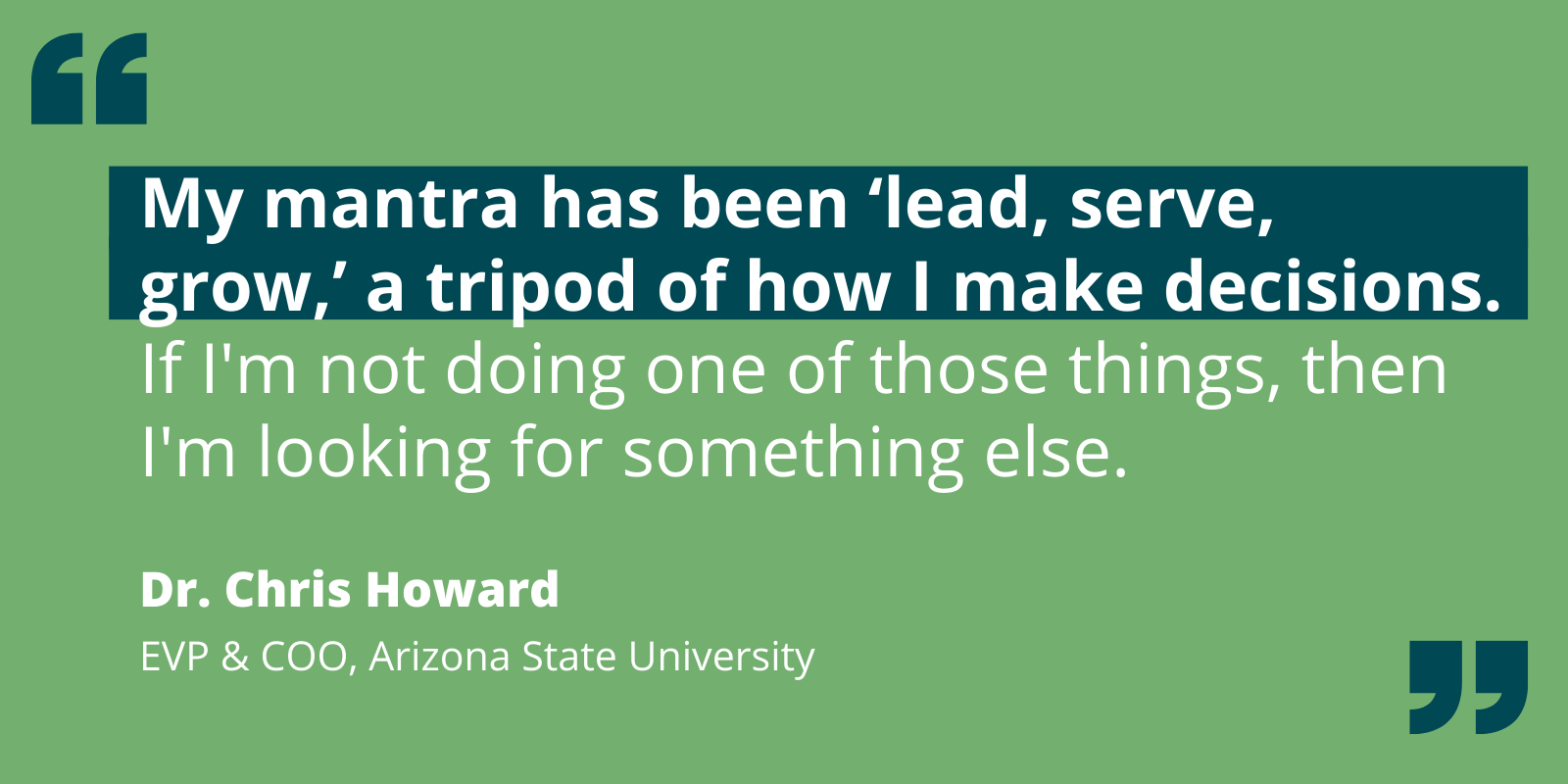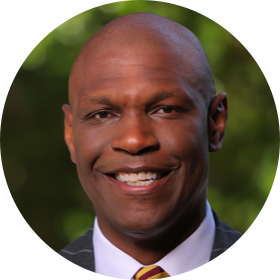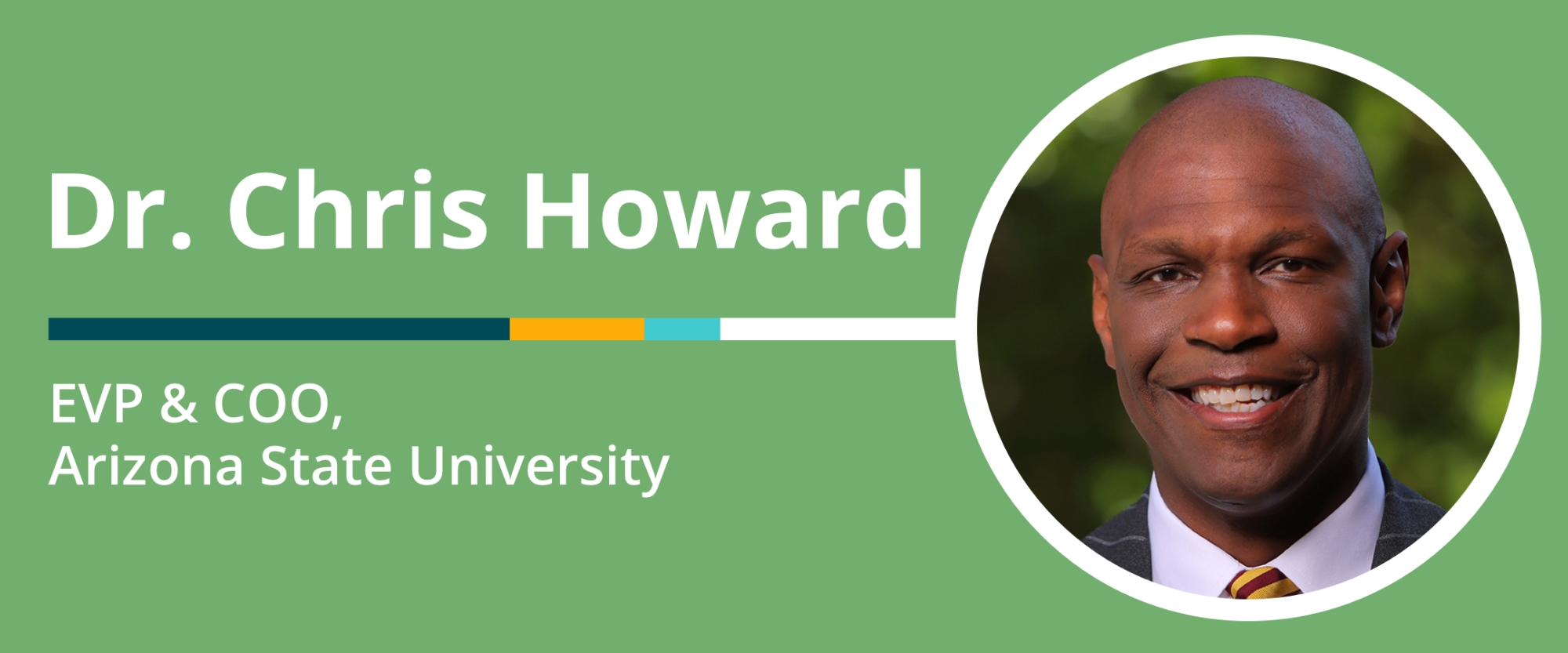As an organization focused on higher education leadership, the University Innovation Alliance (UIA) often uses our Weekly Wisdom Podcast to surface different perspectives on institutional management. Dr. Chris Howard, Executive Vice President and Chief Operating Officer at Arizona State University, arrived at his present position by an unconventional route, and he spoke with us about how leadership is more than a title, what a president actually does, an early lesson from the military, and three books that helped him define his role.
Leadership on a Bigger Scale
In higher ed, as in so many other sectors, the top leadership positions are seen as the endpoint of career steppingstones. The final stone is the presidency, and the next step is retirement. Dr. Howard’s experience has been somewhat different. At age 39, he was appointed to his first presidency at Hampden-Sydney College, and was well into his second presidency at Robert Morris University when he started considering a different type of role at Arizona State University:
“ASU President Michael Crow kind of collects people. I'd met him years ago on the Knight Commission on Intercollegiate Athletics and stayed in touch. And I remember getting an email, ‘Hey Chris, let's talk.’ And finally, after six or seven Zoom calls, I said, ‘I'm in a point now where I can work at a level of scope and scale and do some of the things that I wanted to do in Hampden-Sydney, that I want to do at Robert Morris. We did well improving retention student outcomes, moving up in ranks, all these sorts of things, but I want to do this at a scale that could only be done in a place like Arizona State University.’ We’d been impacting the lives of 5,000 students, and I wanted the challenge of impacting the lives of 180,000 students, not to mention 350,000 learners that aren't even degree-seeking. As a former military person, the idea of moving over to a high-level support position and backing the echelons of command was not that alien to me.”
Dr. Howard reflected on how an impressive team matters more to him than an impressive title:
“I started off as an associate vice president at University of Oklahoma. I said, ‘Eventually, I'll start knocking off adjectives and I'll be the boss, right?’ But eventually, I thought, ‘I have nothing to prove, but lots that I want to do.’ So, I checked my ego at the door, and I just said, ‘This is the team I want to be on now.’ And I've enjoyed being, not just with Michael, but my other five executive vice presidents who are also outstanding.”
The Actual Face of a College Presidency
While Dr. Howard’s unique background includes military service and the private sector, he offers valuable perspective for higher ed leaders in a video called "Eight Ways to Accelerate Your Leadership Odyssey". He shared some of that wisdom with us:
“To be successful, you got to get a Ph.D. in yourself and be self-aware, understand what motivates you, why you're motivated by that, and just be brutally honest about what you like, what you don't like, what you're willing to crawl through the fire for, hills you're willing to die on, et cetera. One of the key things is self-awareness and fit. So sometimes, not just wanting to be a president, but wanting to be so badly, you go to a place where it's not a good fit. So, you have to be honest about these things.
“Most of the job of the presidency is bad news. If things are going well, you're really not needed that much. I remember years ago when Dick Cheney was the Secretary of Defense, I heard him say, ‘By definition, if a decision comes to me, then it's hard because if it was easy, it should have been made before.’ So, you're always dealing with finite resources, having to choose one constituency over another. You're having to deal with bad messages. Something went wrong in an athletic program. Something went wrong with a school redesign. Something went wrong with fundraising. You have to spend a lot of time just dealing with people, making them okay as you create the shared vision, you can't knock them over the head with it. So, if you think you want to be a president, make sure you look behind the curtain, because it is not fun as much as you think it might be fun. If you think you sit at the head of table and just dictate this, that, and the other, first off, you don't last long, and secondly, you're not going to be effective.”
Leadership Through Service
Dr. Howard offered some additional insight into how he makes decisions:
“The last 15 or 20 years, my mantra has been ‘lead, serve, grow,’ a tripod of how I make decisions. If I'm not doing one of those things, if I'm not leading, I'm not serving, I'm not growing, then I'm looking for something else. So, finding that Zen, that moment, that tripod has been very, very important to me.

“On the journey, certain people just come into your life and give you these wise points that carry the day. When I was at Oxford on the Rhodes Scholarship, I had a guy named Colonel Mark Hyatt, an F-111 squadron commander of the nearby base. And I remember him telling me when I was 23, 24 years old, ‘You can serve your country in many different ways. It might be in uniform, it might not be in uniform. Just understand that at the United States Air Force Academy, we're making leaders of character to serve our nation and serve our democracy.’ So, when I made the decision to leave active duty, I thought, ‘It's okay because Colonel Hyatt said it.’
Recommended Reading for Higher Ed Leaders
We always like to ask our guests for reading recommendations, and Dr. Howard generously supplied a few titles to benefit aspiring leaders:
“First thing is The Autobiography of Malcolm X. Malcolm X was a strong Black man who stitched together his life going from a great student, then a prison hustler, Nation of Islam, changed his mind and was not a Black Muslim, but a Muslim in general, and how he carried his authentic Black self forward. That was really reaffirming for me as a guy who lived in a bunch of different backgrounds. That was powerful.
“There's another book called On Becoming a Leader by Warren Bennis, who had been a university president and a combat infantryman in Korea at the Marshall School. He taught there and was a whisperer for many CEOs on the West Coast of Silicon Valley. In that book, it talks about leadership as a journey to becoming your authentic self. He talks about the importance of being the other. So, it's a very vulnerable point.
“Team of Teams is a great book by General Stanley McChrystal, a guy I worked for on a couple of occasions. General McChrystal ran Joint Special Operations Command in Iraq and created this thing called Team of Teams. He said a couple of amazing things about shared consciousness, a common vision, the importance of taking complications out when you're dealing with a complex environment. He was running this operation where we had CIA, National Security Agency, Central Command, Joint Special Operations. He wove that together using technology to get effective outcomes. Well, ASU’s Michael Crow is kind of like the General Stan McChrystal of higher education, because he's weaving together technology, industry, civil society, all these things done at scale in a pretty masterful way. So as I was reading that and thinking about joining this Team of Teams, these great people at here ASU, it felt right, this intense focus on opportunity and access creating a paradigm that's truly an American university, something that's really unique to America.”
Note: This interview in the Weekly Wisdom Series originally aired on September 25, 2023 as part of the University Innovation Alliance’s Innovating Together Podcast, appearing live on Facebook, Twitter, and LinkedIn.
Links Mentioned in This Episode
• University Innovation Alliance
• Weekly Wisdom Podcast
• Dr. Chris Howard
• Arizona State University
• Hampden-Sydney College (Dr. Howard served as president here prior to joining Robert Morris University)
• Robert Morris University (Dr. Howard served as president here prior to joining Hampden-Sydney College)
• "Eight Ways to Accelerate Your Leadership Odyssey" (Dr. Howard’s talk drawn from his administrative experiences)
• The Autobiography of Malcolm X by Malcolm X and Alex Haley
• On Becoming a Leader by Warren Bennis
• Team of Teams by General Stanley McChrystal
Bios of Guest and Co-Hosts

Guest: Chris Howard, Executive Vice President & Chief Operating Officer, Arizona State University
Dr. Chris Howard works closely with ASU President Michael Crow and the other EVPs to coordinate enterprise-wide initiatives and advancement, oversee ASU Enterprise affiliates, advance new enterprise relationships and opportunities, and integrate ASU Enterprise planning and strategy. Dr. Howard is a distinguished graduate of the United States Air Force Academy, earned an MBA with distinction from Harvard Business School, and a doctorate from the University of Oxford as a Rhodes Scholar. His military career included service as a helicopter pilot and an intelligence officer, and he was awarded a Bronze Star for service in Afghanistan. As a member of the Aspen Strategy Group, Dr. Howard co-edited the report "Re-Engineering American Security: Cultivating Talent for Competitiveness" and unveiled its key findings during the 2023 Aspen Security Forum. Prior to joining ASU, he served as president of Robert Morris University, helping it become a preferred strategic partner for corporations, organizations, and professionals in and beyond the Pittsburgh region. Before his tenure at RMU, Dr. Howard was president of Hampden-Sydney College, overseeing a growth in enrollment, improved student outcomes and retention, and an increased endowment. Previously, he served as a vice president at the University of Oklahoma, had a successful corporate career with GE and Bristol-Myers Squibb, and is a former member of the College Football Playoff Selection Committee. Dr. Howard’s wife, Barbara Noble Howard, serves as an ASU Fellow for nonprofit leadership. Their sons Cohen and Joshua are graduates of The University of the South and Middlebury College, respectively.

Co-Host: Bridget Burns, Executive Director, University Innovation Alliance
Dr. Bridget Burns is the founding Executive Director of the University Innovation Alliance (UIA). For the past decade, she has advised university presidents, system chancellors, and state and federal policy leaders on strategies to expand access to higher education, address costs, and promote completion for students of all backgrounds. The UIA was developed during Bridget’s tenure as an American Council on Education (ACE) Fellowship at Arizona State University. She held multiple roles within the Oregon University System, including serving as Chief of Staff and Senior Policy Advisor, where she won the national award for innovation in higher education government relations. She was a National Associate for the National Center for Public Policy and Higher Education, and has served on several statewide governing boards including ones governing higher education institutions, financial aid policy, and policy areas impacting children and families.

Co-Host: Doug Lederman, Editor and Co-Founder, Inside Higher Ed
Doug Lederman is editor and co-founder of Inside Higher Ed. With Scott Jaschik, he leads the site's editorial operations, overseeing news content, opinion pieces, career advice, blogs and other features. Doug speaks widely about higher education, including on C-Span and National Public Radio and at meetings and on campuses around the country. His work has appeared in The New York Times and USA Today, among other publications. Doug was managing editor of The Chronicle of Higher Education from 1999 to 2003, after working at The Chronicle since 1986 in a variety of roles. He has won three National Awards for Education Reporting from the Education Writers Association, including one for a 2009 series of Inside Higher Ed articles on college rankings. He began his career as a news clerk at The New York Times. He grew up in Shaker Heights, Ohio, and graduated in 1984 from Princeton University. Doug and his wife, Kate Scharff, live in Bethesda, MD.
About Weekly Wisdom
Weekly Wisdom is an event series that happens live on Facebook, Twitter, and LinkedIn. It also becomes a podcast episode. Every week, we join forces with Inside Higher Ed and talk with a sitting college president or chancellor about how they're specifically navigating the challenges of this moment. These conversations will be filled with practicable things you can do right now by unpacking how and why college leaders are making decisions within higher education. Hopefully, these episodes will also leave you with a sense of optimism and a bit of inspiration.
Rate, Review & Subscribe
Learn why hundreds of people have rated this new podcast 5 stars! Please join others and rate and review this podcast. This helps us reach and inform more people -- like you -- to help increase the number of college graduates in the United States.
Click here, scroll to the bottom, tap to rate with five stars, and select “Write a Review.” Then be sure to let us know what you loved most about the episode! Also, if you haven’t done so already, subscribe to the podcast. We’ll be adding a bunch of bonus episodes to the feed and, if you’re not subscribed, there’s a good chance you’ll miss out.

